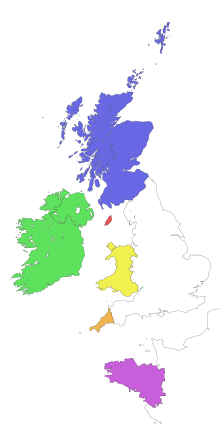User:Kilcurry1234/sandbox

Irish immigration to Scotland dates back to the the early 400's A.D. In Scotland the single major immigrant group originated from Ireland. [needs citation]
History[edit]

Many Irish immigrants began their journey from Dál Riata in Antrim to Argyll along the Scottish Coast. Migrants from Dal Riata were particularly important because they gave their Gaelic language and name to what would now be known as a Scotland.[1] Most Irish immigrants settled along the coast from 400 A.D. on wards. It is believed that connections between the Irish and the Picts in Scotland had already been strong, due to the fact that the Irish helped the Picts during a battle at Hadrian's Wall.[2] It is believed that the first settlers in Scotland consisted of a small number of men and their families who originally came to Scotland for raids but later migrated permanently. The Irish are known to have had a huge impact on Scottish society and culture, as the Irish language spread through Scotland and elements of Irish traditions and beliefs made their way into Scottish tradition.[3]
Scotland saw a rise in immigration levels in the nineteenth century when Ireland suffered devastation during the Great Irish Famine when millions of people left their homeland in search of a better life.
Nineteenth century employment[edit]

In the nineteenth century most Irish immigrants settled in employment in shipbuilding and docklands labor.They worked in Govan and Kinning Park in the Clyde area. Kinning Park belonged to a Govan burgh up until 1871. It was situated along the eastern river frontage on the Glasgow border. It was then developed in the eighteen forties and fifties as a railway station and a dockside. In 1881 the population of the Burgh was slightly over 11,000. From the forties when building began on the new infrastructure, there was a large Irish population living in the streets directly opposite the General terminus Quay and the railway lines.[4] Some also worked in mining communities in Airdrie and Coatbridge which are situated on North Lanarkshire. Both Coatbridge and Airdire are located roughly ten miles from north east Glasgow. By the end of the nineteenth century Irish immigrants contributed to one third of the population.[4]
Discrimination in the work place[edit]
At the time [what time?] 70% of the immigrant community were Catholics and 30% were Protestants. Over time huge social separation began to occur between the two respective groups.[5] This was most visible in areas of Kinning Park, Govan and Coatbridge where mining and dock communities were established. The huge increase of mainly Irish Catholics to Scotland during the famine meant they were a minority in a mostly Protestant Scotland.[6] Many Catholics as a result of this suffered severe discrimination within the workplace. Catholics were only hired for low-paying, unpopular jobs. An example of this is where Irish people would not be hired for middle-class professions like a teacher or nursing.[6] Many Catholics agreed that sectarianism was less likely to occur in low paid, working class, labor jobs. Catholics were identified by their Irish names and their beliefs. This resulted in them having to lie about their religious beliefs or giving themselves a new name or in some cases a new identity in a bid to secure a job in Scotland. This is why Irish people began establishing their own communities within Scotland to avoid the discrimination they faced on a daily basis. When this happened Catholics were then identified by their Irish names, if they attended Catholic schools and showing their support to Celtic Football Club[5]
Celtic Football Club[edit]

Celtic football Club is a professional football club based in Glasgow that was founded in 1888 by Irish immigrants on Glasgow. During this time the majority of the catholic population were of Irish origination.[7] The club was originally founded to help raise much needed funds for charities that worked with the poor Irish Catholic population in Glasgow. Many of the clubs donees when directly to Irish causes like the "Evicted Tenant's Club" and aspects of "Irish Nationalist Politics".[7] Those involved directly with the club, players, officials and supporters for example, were often very interested in politics and supported the beliefs of home rule, they opposed British rule and protested for release of Irish political prisoners.[7] Still today the nature and motives of Celtic supporters is Scotland is seen as a contemporary issue and is still discussed today in society. Although the club is seen as some what controversial it still plays a huge part in Scottish society, with thousands of followers attending games all over the world.
Notable Scots of Irish descent[edit]
Notes[edit]
References[edit]
- ^ Snow, Dean R. (2001). "Scotland's Irish Origins". Archaeology. 54 (4): 46–51.
- ^ Snow, Dean R (2001). "Scotland's Irish Origins". Archaeology. 54 (4): 46–51.
- ^ Snow, Dean R (2001). "Scotland's Irish Origins". Archaeology. 54 (4): 46–51.
- ^ a b Foster, John (November 2011). "Irish immigrants in Scotland's shipyards and coalfields: employment relations, sectarianism and class formation". Historical Research. 84 (226): 657–692. doi:10.1111/j.1468-2281.2010.00554.x.
- ^ a b Foster, John (November 2011). "Irish immigrants in Scotland's shipyards and coalfields: employment relations, sectarianism and class formation". Historical Research. 84 (226): 657–692. doi:10.1111/j.1468-2281.2010.00554.x.
- ^ a b Walls, Patricia (2003). "Sectarianism at work: Accounts of employment discrimination against Irish Catholics in Scotland". Ethnic and Racial Studies. 26 (4): 632–661. doi:10.1080/0141987032000087343.
- ^ a b c Bradley, Joesph M (Spring 2008). "Celtic Football Club, Irish Ethnicity, and Scottish Society". New Hibernian Review / Iris Éireannach Nua. 12 (1): 96–110. JSTOR 25660757.
